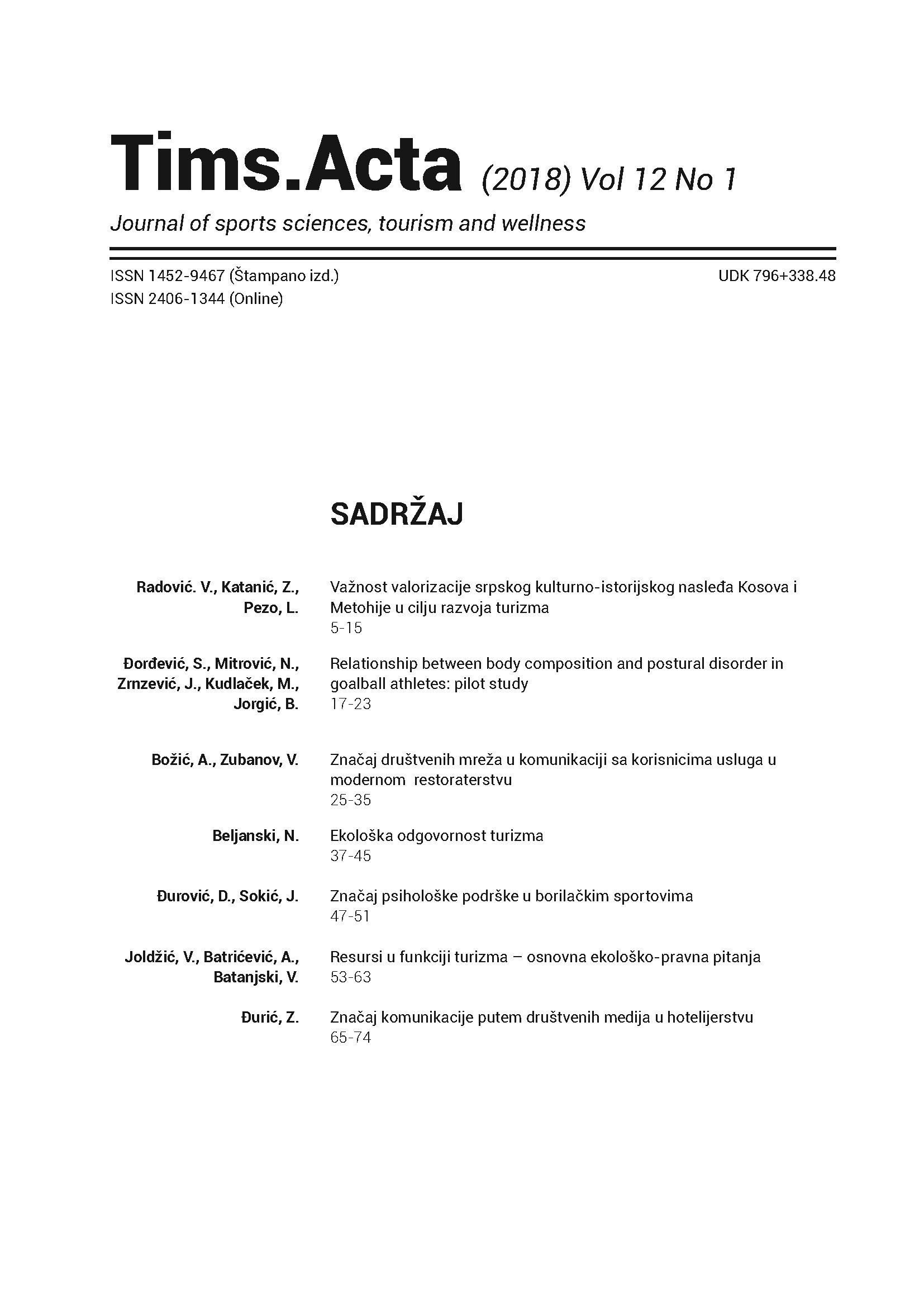ZNAČAJ KOMUNIKACIJE PUTEM DRUŠTVENIH MEDIJA U HOTELIJERSTVU
Sažetak
Sažetak
Globalna ekspanzija korisnika društvenih medija veoma je velika, dok njihova popularnost sve više raste. Ovakav rast i popularnost ukazuje i na značaj poslovne komunikacije putem ovih medija svih privrednih subjekata, a posebno u sektoru turizma i hotelijerstva, kao uslužne delatnosti u kojoj je komunikacija s potrošačima i klijentima primarna osnova za uspešno poslovanje. Cilj rada jeste da ukaže na značaj ove komunikacije u turizmu i hotelijerstvu. Tema je odabrana zbog svoje aktuelnosti i značaja ove komunikacije za uspešno poslovanje turističkih i hotelskih preduzeća u sve zahtevnijem poslovnom okruženju i neophodnosti stalne interakcije s potrošačima i klijentima kako bi se pratilo njihovo mišljenje, stavovi o kompaniji i kvalitetu pruženih usluga, kao i njihovo zadovoljstvo tim uslugama, a time i poboljšali efekti i rezultati poslovanja.
Ključne reči: društveni mediji, komunikacija, turizam, hoteli.
Reference
Anderson, K .C. (2012).The Impact of Social Media on Lodging Performance. The Center for Hospitality Research, Cornell University Cornell Hospitality Report , 12(15).
Atmosphere Research Group. (2017). Using Guest Reviews to Pave the Path to Greater Engagement. Retrived from https://www.tripadvisor.rs/
TripAdvisorInsights/n2656/research-najvaznije-zakljucke-iz-izvestaja-using-guest-reviews-pave-path-greater-engagement#sthash.Ets3yfK2.dpuf 2017 May 08.
Boyd, D., & Ellison, N.B. (2007). Social network sites: Definition, history, and scholarship. Journal of Computer Mediated Communication, 13(1), 11.
Browning, V., So, K., & Sparks, B. A. (2013). The Influence of Online Reviews on. Consumers' Attributions of Service Quality and Control for Service Standards in. Hotels. Journal of Travel & Tourism Marketing, 30 (1-2), 23-40.
Buhalis, D., & Mamalakis, E. (2015). Social Media Return on Investment and Performance Evaluation in the Hotel Industry Context. Information and Communication Technologies in Tourism, 241-253.
Christou,E., Nella, A., Sigala, M., Christou, E., & Gretzel, U. (2012). Web 2.0 and pricing transparency in hotel services. Social Media in Travel, Tourism and Hospitality: Theory, Practice and Cases, 133.
Enz, A. C., Canina, L., & Lomanno, M.(2010). Competitive Hotel Pricing in Uncertain Times. Cornell Hospitality Report, Center for Hospitality Research, 9(10).
Godes, D., & Mayzlin, D. (2009). Promotional chat on the Internet. Marketing Science, 28(4), 721-739.
Hoffman, D. L., & Novak, T. P. (2012). Toward a Deeper Understanding of Social Media. Journal of Interactive Marketing, 26, 69–70.
Holloway, J. C. (2004). Marketing for Tourism. Essex: Pearson Education Limited.
HVS. (2010). How Are Hotels Embracing Social Media in 2010 - HVS.com. Retrieved from https://www.hvs.com/staticcontent/ library/ nyu2010/journal/.../socialmediain2010.pdf 2017 Dec 30
InterContinental Hotel Group. (2017). Industry market and Trends. Retrieved from https://www.ihgplc.com/about-us/industry-and-market-trends 2017 Dec 30.
InterContinental Hotel Group. (2016). Meaningful Membership Report. Retrieved from https://www.ihgplc.com/news-and-media/ihg-trends-report/Social%20Media/2016_trends_report.pdf 2017 Dec 30.
Jobber, D., & Fahy, J. (2006). Foundations of Marketing, 2nd edition. London: McGraw-Hill.
Kaplan, A., & Haenlein, M. (2010). Users of the world, unite! The challenges and opportunities of social media. Business Horizons, 53, 59-68.
Kavoura, A., Katsoni, V., Vassiliadis, C., & Vlachopoulou, M. (2013). From e-business to c-commerce: collaboration and network creation for an e-marketing tourism strategy. Tourismos, 8(3), 113-128.
Kietzmann, J. H., Hermkens K., McCarthy, I. P., & Silvestre, B. S. (2011). Social media? Get serious! Understanding the functional building blocks of social media. Indiana University: Kelley School of Business, 241.
Kim, W. G., Lim, H., & Brymer, R. A. (2015). The effectiveness of managing social media on hotel performance. International Journal of Hospitality Management, 44, 165-171.
Kim, Y.A., & Srivastava, J. (2007). Impact of Social Influence in E-Commerce Decision Making. In Proceedings of the 9th International Conference on Electronic Commerce (pp. 293-302). Minneapolis.
Krapac, I. (2016). Facebook ima gotovo 1,6 milijardi korisnika, ali i prihod od 5,8 milijardi dolara. Preuzeto 30. decembra 2017. sa http://www.netokracija.com/facebook-korisnici-prihod-rezultati-2016-112942.
Lovet, J. (2011). Social Media metrics secrets. Hoboken: John Wiley & Sons.
Manchanda, P. (2010). Three ways to leverage social media - and two mistakes to avoid. Preuzeto 27. maja 2017. sa http://www.bus.umich.edu/NewsRoom/ArticleDisplay.asp?news.
Mowat, B. (2010). Social media: Is it a friend, or foe? Canadian Travel Press, 42(26), 8-22.
Nielsen Company. (2010). Global online reports. Retrieved from http://www.nielsen.com/us/en/insights/news/2010/global-online-shopping-report.html 2017 May 07.
Noone, B.M., McGuire, K.A., & Rohlfs, K.V. (2011). Social media meets hotel revenue management: Opportunities, issues and unanswered questions. Journal of Revenue and Pricing Management, 10 (4), 293-305.
Preston, I. (1976). Theory of Behavior and the Concept of Rationality in Advertising. Journal of Communication, Vol. 17 (3), 211-222.
Radisson Hotel Group. (2017). Radisson Twiter Status. Preuzeto 7. maja 2017. https://twitter.com/Radisson/status /610469708429688832/ photo/1?ref_src=twsrc%5Etfw&ref_url=http%3A%2F%2 2017 May 07.
Statista – Statistics Portal. (2017). Most Famous Social Network Sites Worldwide as of September 2017. Preuzeto 29. decembra sa https://www.statista.com/statistics/272014/global-social-networks-ranked-by-number-of-users
Schindler, M.R., & Bickart, B. (2005). Consumer Psychology. In Hauvgedt, C., Machleit, K. & Yalch R. (Eds.), Understanding and Influencing Behavior in the Virtual World. Mahwah: Lawrence Erlbaum Associates.
TripAdvisor. (2017). TripAdvisor Research Insights. Preuzeto 8. maja 2018. sa https://www.tripadvisor.rs/TripAdvisorInsights/n2656/research-najvaznije-zakljucke-iz-izvestaja-using-guest-reviews-pave-path-greater-engagement#sthash.Ets3yfK2.dpuf
Vlada Republike Srbije, Kancelarija za informacione tehnologije i elektronsku upravu. Preuzeto 3. maja 2017. sa http://www.deu.gov.rs/doc/Smernice%20za%20koriscenje%20drustvenih%20mreza%20u%20javnoj%20upravi.pdf.
Wang, D., Park, S., & Fesenmaier, D. R. (2012). The Role of Smartphones in Mediating the Touristic Experience. Journal of Travel Research, 51(4), 371-87.
We are Social. (2017). Preuzeto sa https://wearesocial.com/special-reports/digital-in-2017-global-overview.
Xiang, Z., & Gretzel, U. (2010). Role of social media in online travel information search. Tourism Management, 31 (2), 179-188.
Ye, Q., Law, R., & Gu, B. (2009). The impact of online user reviews on hotel room sales. International Journal of Hospitality Management, 28 (1), 180-2.
Zhou, Z. (2004). E-commerce and information technology in hospitality & tourism. 1st ed. Clifton Park, NY: Delmar Learning.
- Autori zadržavaju autorska prava i pružaju časopisu pravo prvog objavljivanja rada i licenciraju ga "Creative Commons Attribution licencom" koja omogućava drugima da dele rad, uz uslov navođenja autorstva i izvornog objavljivanja u ovom časopisu.
- Autori mogu izraditi zasebne, ugovorne aranžmane za neekskluzivnu distribuciju članka objavljenog u časopisu (npr. postavljanje u institucionalni repozitorijum ili objavljivanje u knjizi), uz navođenje da je članak izvorno objavljen u ovom časopisu.
- Autorima je dozvoljeno i podstiču se da postave objavljeni članak onlajn (npr. u institucionalni repozitorijum ili na svoju internet stranicu) pre ili tokom postupka prijave rukopisa, s obzirom da takav postupak može voditi produktivnoj razmeni ideja i ranijoj i većoj citiranosti objavljenog članka (Vidi Efekti otvorenog pristupa).

